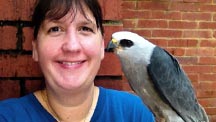Foie gras (pronounced fwah grah), the fattened liver of an overfed duck or goose, is considered one of the great delicacies of French cuisine. It is a luxury product with a meaty, nutty taste and a velvety texture. Unfortunately, the method used for producing the treat is horrible and cruel.
Waterfowl, either geese or ducks, are force fed large amounts of grain by means of a metal pipe forced down the esophagus. The force feeding enlarges the bird’s liver, up to 10 times the normal size. The bird is then slaughtered and the enlarged liver is removed to make foie gras.
The practice of over-feeding birds to produce a fattened, tasty liver, may date back to 2500 B.C. Egypt, where reliefs of the practice have been found on ancient tombs.
Today, 80% of the world’s foie gras is produced in France. Quebec also has a large foie gras industry.
Because birds do not chew and have no gag reflex, they can easily be force fed large amounts of food. In the final stage of feeding, the birds are force fed for 12 to 18 days, two to three times per day. The force feeding causes large amounts of fat to accumulate in the liver, which produces the buttery consistency of foie gras.
The forceful methods used to feed the birds sometimes result in damaged esophagi, which can lead to a slow and painful death. The birds may choke on regurgitated food, or bleed to death. The average (pre-slaughter) mortality rate for birds on foie gras farms is up to 20 times higher than duck farms which do not produce foie gras. Veterinarians have also claimed that a bird carrying an enlarged liver may suffer “unspeakable pain and suffering.” Birds with enlarged livers may also be unable to stand upright or walk.
In late 2003, a consortium of French animal rights groups claimed that the practice of force feeding birds is already illegal under existing animal protection laws of France and the European Union. The EU law states that “reasonable steps (must be taken)… to ensure that … animals are not caused unnecessary pain, suffering or injury.” Foie gras producers affirm that force feeding does not constitute pain or suffering of the ducks and geese. Industry groups and researchers claim that animals even appreciate the feeding method.
One alternative method of producing a similar food suggests the surgical removal of livers from birds which have died of natural causes, and soaking them in mixtures of gelatin, alcohol and buttermilk.
Foie gras is illegal in several jurisdictions. Force feeding is already prohibited in the following countries: Argentina; the Czech Republic; Denmark; Finland; Germany; Ireland; Italy; Luxembourg; Norway; Poland; Sweden; Switzerland; the Netherlands; and the United Kingdom. Israel was the world’s third largest producer of the product when it was banned there in March 2005. Legislation is currently pending in California. Force feeding in that state is slated to become illegal in 2012. The sale of foie gras will also be illegal, if the method of production includes force feeding. Foie gras is currently served in about 300 California restaurants.
Foie gras has been produced in the state of New York at Hudson Valley Foie Gras since 1989. The company distributes the product nationwide. The ASPCA has filed charges against the company in the past for the force-feeding of ducks, but so far the District Attorney involved has not taken action.
Related articles:
Gourmet Cruelty
Stop Force Feeding
Does a Duck Have a Soul?
An ending made in Hollywood for an epic fight over foie gras
Welfare Aspects of the Production of Foie Gras in Ducks and Geese
Sources:
Foie gras
What is Foie Gras?
Debunking The Myths
How Foie Gras Is Produced
California Bans Foie-Gras Force-Feeding
Israel Bans Force-Feeding Geese For Foie-Gras
Share the birds, share the love!



